

Most people in the U.S. don't realize that our electronic connections depend on minerals from The Democratic Republic of the Conge (DRC) nor do they pay much attention to a war in that country that has claimed more lives than any conflict since World War 2. Fact: The death toll in the DRC since 1996 exceeds five million. In addition, according to Human Rights Watch more than 200,000 women have been raped during the conflict, making the DRC the most dangerous place in the world for women. The source of the conflict: the country holds the world's largest deposits of coltan, an essential component for cellphones, play stations and other electronic devices.Belgium, the former colonial power in the DRC is the largest importer of this coltan.
Two groups of students at the UIUC have made ambitious attempts to raise awareness about events in the Congo: the organization “Invisible Conflicts” and a group of students from History 596. We are highlighting their important and outstanding work in this Habari.
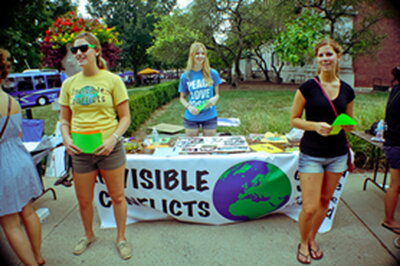
Invisible Conflicts is a national organization which began on campus in 2006. For each of the last three years they have held a “Congo Week” which includes a number of events aimed at raising the consciousness of the people on campus about the situation in the Congo.To read more about Invisible Conflicts and Congo Week, click here.
The students of History 596 made a video in which they interviewed members of the local Congolese community about their experiences of the war. To read more about this video, play the interview below.
History Students Create Film on Truth and Reconciliation in Congo
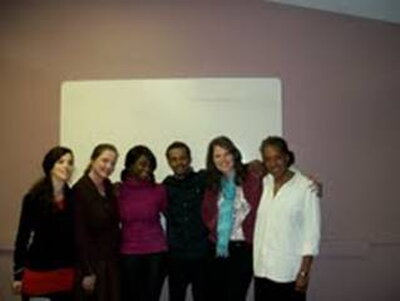
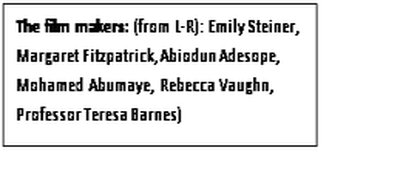
As part of a History 596 class on Truth and Reconciliation Commissions, a group of students made a film based on interviews with people in the local Congolese community about their experiences of the war. Here the students tell the story of how they made the film.
The students had taken a class with Professor Barnes in the fall of 2010 on truth commissions where they discussed peace and reconciliation in several African countries. They decided to pursue this interest further by talking to immigrants from the Democratic Republic of the Congo (DRC) in the local Champaign-Urbana community. The students were interested in hearing Congolese opinions on peace and reconciliation in the DRC, in particular on different justice models that have existed in the Congo, and others that could be useful in the future.
The students interviewed seven Congolese, five men and two women. The interviews were recorded either by video or audio, or both, depending on the interviewee's preference. The total project lasted from January to May 2011. The first two months were spent creating the project, researching aspects of the conflicts and justice models in the DRC, and preparing interview questions, consent forms, and other documentation in accordance with the Institutional Review Board (IRB). As soon as IRB approval was received, the students scheduled interviews with the participants and interviewed them. When the interviews were completed, the students transcribed the interviews. The students and Professor Barnes then discussed the content of the video documentary and ways to present the project.
The project was presented at the UIUC College of Education on Campus Seminar Series in April 2011, at the Northwestern University Symposium: The Oral History and Performance as Social Action Project for Black Diaspora Studies (OPASA), UIUC Center for African Studies Brown Bag in October 2011, and at Stone Creek Church (Urbana, Il) in November 2011.
The final video documentary is a combination of interview excerpts and students' impressions of the project. The documentary is therefore both an overview of the students' research journey and poignant interview quotes.
Invisible Conflicts: Reminding People of the Costs of War
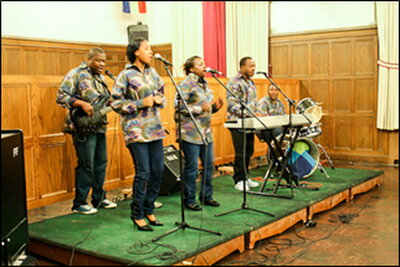
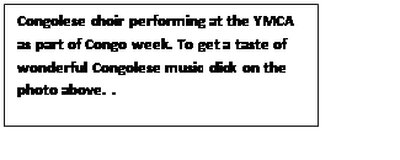
Invisible Conflicts began at UIUC in 2007 and they presently have about a dozen members. They staged Congo week to bring awareness to the UIUC community. This year’s was the most ambitious and included a Coltan Awareness Center on the Quad, a panel discussion at the YMCA, a film showing of “The Greatest Silence: Rape in the Congo,” and a musical session with a delightful choir made up of locally-based Congolese musicians.
When asked what made them interested in the Congo, members of the group had different answers. Events Coordinator Paul Dolmon was moved by what he called the “worst humanitarian crisis since World War 2” and noted that if it were happening in “Europe or some other Western country it wouldn’t be invisible.” For Apexa Mamtora, the issue of the massive rapes of women was of particular concern.
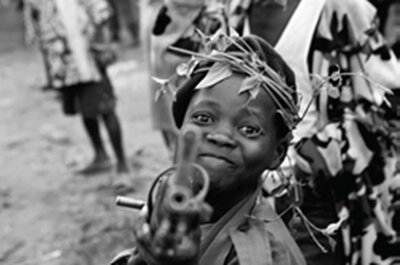
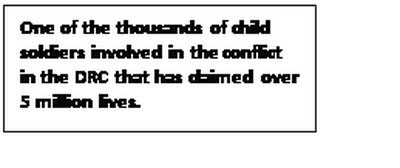
All the members agreed that the competition for minerals was at the heart of this horrific conflict. They had a number of recommendations as to how to put an end to this war. At the individual level, they suggested people should be sure to recycle cellphones, thereby reducing the demand for coltan. Some of the members believed that the “instability is profitable”, that it enabled companies to access resources more cheaply and therefore getting politicians to pressure these companies was key. The members generally felt that companies needed to be accountable in terms of where they sourced coltan. They also said it was important to make sure the university was not dealing with any companies that profited from coltan smuggled out of war zones.
In addition to their Congo Week, Invisible Conflicts will take part in their annual campaign around educating war orphans in Uganda. If you want to join them in their work at UIUC, please contact them at: invisibleconflicts.list@gmail.com
Congo Links
- Link to Justice in the Congo
- Friends of the Congo: http://www.friendsofthecongo.org/our-story/mission-a-vision.html
- Congo Connect Youth Project: https://friendsofthecongo.org/youth/
- Congo Primer: http://www.friendsofthecongo.org/congo-primer.html
- Human Rights Watch Video: Protecting Civilians in the DRC: http://www.hrw.org/video/2010/09/03/hrw-congo
- Women on the Frontline: http://www.youtube.com/watch?v=mqqmNA0al9Q
- Breaking the Silence: http://congoweek.org/
INVISIBLE CONFLICTS is a student organization started at Loyola University Chicago devoted to exposing the conflicts which are neglected by most western media and governments. We tell the stories of these invisible conflicts through the use of film, music, and conversations. It is the mission of IC to build relationships between communities of power and privilege to communities of poverty and oppression. Through the exchange of cultural values and knowledge, we find practical ways to help one another end violence, strengthen education, re-establish culture, eradicate poverty, and renew overall quality of life and well-being for those In the Fall 2006, IC established the Dwon Madiki Partnership, which provides an education for 20 orphans in Northern Uganda